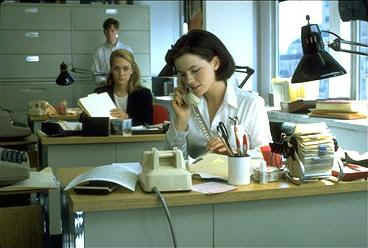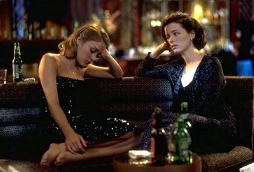Ellen and Jim Have a Blog, Too
We are two part-time academics. Ellen teaches in the English department and Jim in the IT program at George Mason University.


The acid test: Austen and Whit Stillman · 15 May 07
Dear Marianne,
I know I’ve not written to you for ever so long. I have been tired, sick, and discouraged too: reading through my students’ papers is an appalling experience as (with a very few exceptions), I see how little time or effort most of them put into their work, how little understanding some have, and how many and egregious are the lies they tell—as if they’ve learned any one will do and cannot fathom there might be someone (me) for whom their choices and behavior is so contemptible a way to exist as to evoke revulsion. It is not an effort to behave decently.
So I’ve not had heart for letters to you.
So also the worlds I come across (in people, through books, here in cyberspace) seem so resolutely at a distance; in articles I read in the periodicals I get it seems what’s wanted is the trivializing, as if that’s safe and of course does not threaten the lack of accomplishment of the hired reader. Others (friends on line, people I come across while wandering about) are exhausted from the effort of endurance. Don’t have time to say much—except maybe some blogs :).
Perhaps it’s really I can’t find a subject adequate to the emotions I’ve been feeling lately. A depth of sadness overcomes me, but the materials to hand don’t warrant it, will not sustain, justify, indeed contradict such a mood. No objective correlative (a phrase from T. S. Eliot)? I am finding some sustenance in these older BBC mini-series, just now the careful brilliance of the 1983 BBC Mansfield Park. Oh how deeply felt is this movie. Wait. There is a subject adequate, Austen’s Mansfield Park and this 1983 BBC mini-series.
The opening is a slow subtle study of how Fanny Price’s character developed, and how she came to be the loving decent woman she is. I have not begun to do just to it. Here I have but room for two stills. Here are Fanny and Edmund growing up together lost in the meadows surrounding the house (glimpsed in the trees, he reciting Cowper (on the changing seasons, on time), she listening. Note the lovely yellows flowers scattered in the green grass—these colors, green, yellows, browns, dominate the palette of the early part of this movie.
And here she is: our first vision of Sylvestre Le Tousel as Fanny now listening to an adult Edmund reading Cowper. How anyone can go on about her plainness is beyond me. She is filled with love, absorbed fully by the words and man before her. It strikes me as so ironic how so many people fail to see what’s in front of them: Austen’s hidden love for one of her brothers.
I must write about this film here again, and in my paper—at length too.
Also begin (for the first time here) somehow to write about Stillman’s Metropolitan (1990, recognized as an adaptation of Austen’s Mansfield Park) and his astonishing The Last Days of Disco (1998) here too—which I’ve been putting off. Actually here paradoxically I’ve felt too much effort is required (says she smiling).
How begin to speak of Stillman’s first and third film?
Let me try these paragraphs: there are two hymns sung in Stillman’s last movie. The first by Charlotte, played by Kate Beckinsale, a recreation of Austen’s Emma character mixed with some of the characteristics of Austen’s Elinor Dashwood. You need to know Stillman’s Last Days of Disco has a general framework which also repeats the doppelgänger pair of Elinor and Marianne Dashwood (us, my dear) in its two heroines, Alice Kinnon (Chloe Sevigny) and Charlotte Pingress (Kate Beckinsale). The girls, both in their early 20s, work in the same office (desk-by-desk), share an apartment, support one another in going to the club and dancing & talking the night away sometimes with others, sometimes side-by-side:
Charlotte (Kate Beckinsale) and Alice (Chloe Sevigny) at the club
Whitman’s free approach to adaptation allows him to have his Emma-Charlotte apologize humbly to Alice after Charlotte cruelly mortifies Alice by saying before the assembled group of friends that Alice has a venereal disease. Charlotte is scolded by her boyfriend, Jimmy Steinway (Mackenzie Astin) in true Mr Knightley vein: “How could you, Charlotte?” A few scenes later in a moment of intense emotionalism, Charlotte, like Elinor to Marianne (like me to you), reveals to Alice a side of her experiences she had kept hidden from Alice: Charlotte had thought she was pregnant and looked forward to telling the father, Jimmy, assuming that Jimmy would rejoice, only to discover Jimmy was on the point of proposing breaking up (he’s really no Mr Knightley, rather a cad-like Frank Churchill). Charlotte’s psychosomatic pain lands her in hospital and she sings “Amazing Grace” self-referentially, beautifully, and with great humility.
Amazing grace, how sweet the sound
That sav’d a wretch like me!
I once was lost, but now am found,
Was blind, but now I see.
This moment becomes a comment on Austen’s character Emma who far from humbling herself and apologizing at the close is complacent by the novel’s end and yet is showered with rewards.
The other is spoken hesitantly by the man Alice ends up with, Josh (played by Matthew Ross), a frank reincarnation of Edward Ferrars as open depressive, someone who is ethical and wants to war against an amoral aggressive ambitious society. He is looking to see how Alice reacts to his perception of the experience of life:
Breathe through the heats of our desire
Thy coolness and thy balme,
Let sense be dumb, let flesh retire,
Speak through the earthquake, wind, and fire
O still small voice of calm
(Quoted by James Bowman, “Whit Stillman, Poet of Broken Branches,” Doomed Bourgeois, ed. M.C. Henrie, 2001 ISI Book, p. 42).
Here is an early still where we see how Charlotte cannot resist insulting Josh. Austen’s Emma shows the impulses of a bully when she can’t resist insulting and caricaturing Miss Bates and tells foul tales about Jane Fairfax (that could hurt her). Here Charlotte smells Josh’s vulnerability, and, animal-like, resents it, and strikes out.
In the debased worlds of culture we are surrounded by a longing for peace and quiet becomes a sign of illness (=depression).
One is unable to speak because the validity of the conversation one wants to enter into is denied, thwarted by barbed defensiveness, or simply swept away as “spoilers.” I love Audrey Rouget (the Fanny Price of Metropolitan) when she says, the path ahead of her includes “the prospect of wasting your whole productive life, of personal failure” (Screenplay, 1994 Faber ed, p. 182). “The acid test” (says another character, one of the young men who we see spending an evening mostly silently drinking at a bar, ”—the acid test—is if you get any pleasure from answering the question, ‘What do you do?’” For him the answer that would come is unbearable: ”’I can’t bear it’”?
As I have no adequate stills from Metropolitan as yet, I substitute this from Last Days, Alice and Charlotte at the publishing office:

Charlotte (Kate Beckinsale) and Alice (Chloe Sevigny) at their jobs in publishing
Alice has pushed for a book she finds a beautiful true depiction of the Tibetan religion, only to discover by the end of the movie the author has faked his identity. Well, she decides to use that, and publish the book as an imaginative recreation … And sell it based on the scandal and lying too (brings in more readers than the text itself).
Audrey asks, “Has it ever occurred to you that today, looked from Jane Austen’s perspective, would look much worse than ridiculous?” (p. 177)
Elinor
--
Posted by: Ellen
* * *
Comment
- Small bonus from illness: I can close all my skirt buttons, zip up the zippers to the top with ease :). I've never liked wearing clothes that feel tight on me. So it's an ill wind that does no good at all.
E.M.
— Elinor May 15, 9:39am # - I do agree about how wonderful the older Mansfield Park is. If only there were some newer adaptations that took this sort of time and let a story develop at its own pace, instead of rushing it through to save money. I also think Sylvestra Le Touzel is just right as Fanny and couldn’t care less if she isn’t conventionally beautiful. You make Metropolitan and Last Days of Disco sound well worth seeing.
Sorry to hear you have been feeling melancholy – I’ve been finding this too in recent days although I’m not sure why. In my case I am often tempted to take refuge in wild melodrama, but also in costume dramas (which are sometimes melodramatic too). One I saw this weekend was The Golden Bowl, starring Jeremy Northam, Uma Thurman and Kate Beckinsale, which I mainly liked – I’ve never read the novel, so that is another one to add to my list.
— Judy May 15, 5:11pm #
commenting closed for this article

